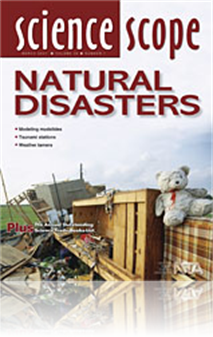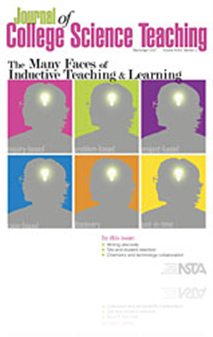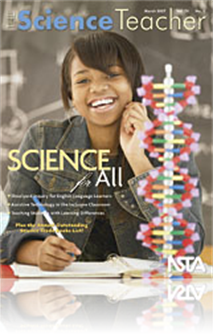All Resources
Journal Article
Scope on Safety: When is a classroom a laboratory?
What are the bare bones that must exist for a room to be considered safe for teaching laboratory science? This month’s issue of Scope on Safety addresses this question by first defining when a laboratory is really considered a laboratory. Next, the...
Journal Article
Society for College Science Teachers: Never Underestimate the Dark Side of the Force
Implementing best practices, however well supported by research, is resisted by both circumstances and people. Thus, what you read and hear about methods others have used must be modified and compromised to fit the situation at your institution, sadl...
Journal Article
Wars are fought over it. The price of it can stir fear, even despair, among us. Energy. Energy drives our universe. Our use of certain types of energy sources may even be destroying our planet. Energy is a difficult topic to conceptualize but student...
Journal Article
Recent studies have indicated that college undergraduates have retained little understanding of the information in the science courses they have taken when they graduate. Science is taught as detailed, factual content and most students are evaluated ...
Journal Article
The Impact of Teaching Assistants on Student Retention in the Sciences: Lessons for TA Training
Attrition from the sciences remains a national problem. This article presents results from a survey of over 2,100 undergraduates that, contrary to previous research, suggests that teaching assistants (TAs) influence student retention in the science...
Journal Article
Coffee Can Speakers: Amazing Energy Transformers
We live with a dizzying array of electronic devices—cell phones, mp3 players, and DVD players to name a few. Students can operate them with amazing ease, but what do they really know about the basic science concepts used in these technologies? Af...
Journal Article
Methods and Strategies: "Inquirize" Your Teaching
The basic elements of inquiry include: ask a question, conduct an investigation, make observations and collect data, use data to develop an explanation, and communicate results. The 5E learning cycle model is very useful for designing lessons that i...
Journal Article
Outstanding Science Trade Books for Students K—12: Books Published in 2006
Apples and oranges … and lychees and loquats—how can one compare? That’s the challenge when a team of NSTA’s best science educators attempt to select the best of each year’s science trade books. It’s been 34 years since NSTA joined forces...
Journal Article
Demonstrating wave processes quantitatively in the classroom using standard classroom tools (such as Slinkys and wave tanks) can be difficult. As a result, through a collaborative effort, The Plymouth Wave Lab website was developed to allow students...
Journal Article
Problem-based learning experiences that extend at least two weeks provide an opportunity for students to investigate a real-world problem while learning science content and skills in an exciting way. Meteorology provides a wealth of problems students...
Journal Article
The Case Study: A Flock of Dodos
Flock of Dodos is a provocative film about intelligent design (ID) complete with animation and argumentative debates along with interviews with pleasant people from Kansas and Pennsylvania, the latest battlefields of the ID debate. The film does not ...
Journal Article
Science Sampler: Dihydrogen monoxide assignment
Chemistry is a subject that uses big words for a world we already know. Many eighth graders come to physical science classes with preconceived fears of chemistry and its big scary words. As a result, the author developed an assignment that addresses ...
Journal Article
Editor’s Roundtable: Stop avoiding your e-mails!
Don’t expect the online “innovation” to go away—email communication is here to stay, and it is your responsibility as an educational professional to respond to them, and even use them to your advantage. This month’s Editor’s Roundtable co...
Journal Article
Editor’s Corner: Science for All
This issue of The Science Teacher (TST) marks our 12th consecutive annual issue devoted to the theme “Science for All.” In its infancy, this special issue focused exclusively on the important topic of teaching science in multicultural classroo...






